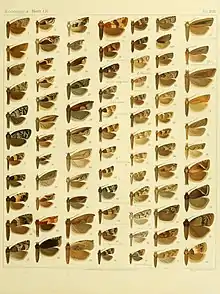| Bactra venosana | |
|---|---|
 | |
| Bactra venosana in Kennel Die palaearktischen tortriciden figure 73, male | |
| Scientific classification | |
| Domain: | Eukaryota |
| Kingdom: | Animalia |
| Phylum: | Arthropoda |
| Class: | Insecta |
| Order: | Lepidoptera |
| Family: | Tortricidae |
| Genus: | Bactra |
| Species: | B. venosana |
| Binomial name | |
| Bactra venosana (Zeller, 1847) | |
| Synonyms | |
| |
Bactra venosana, the nutgrass borer or nutsedge borer, is a moth of the family Tortricidae.[1] It was first described by Philipp Christoph Zeller in 1847. Julius von Kennel provides a full description.[2] It has a wide distribution, from southern Europe, North Africa and Asia Minor to India, Sri Lanka, southern China, Malaya, Australia and into the Pacific where it is found on Java, Borneo, the Philippines, Taiwan, Timor, the Solomons, the Carolines and Fiji. It was introduced to Hawaii in 1925 to control nutsedge. It is now found on Kauai, Oahu, Molokai, Maui, Lanai and Hawaii.
Biology
The larvae feed on Cyperus rotundus[3] and Kyllinga species, including Kyllinga brevifolia and Kyllinga monocephala. They bore the stem of their host plant.
Affected plants first show a withering of the inner leaves, which become yellow and finally die. Early instars are pale, glassy yellowish, with a shining black head. Full-grown caterpillars are green or pale yellowish. They spin a tube of silk in the stem and in this cocoon sheds its skin to turn into a pupa of about 5–7 mm long. Adults have grayish forewings with complex brown markings. Hindwings plain grayish.[4]
Control
Mechanical methods such as hand picking of adults and caterpillars are effective. Pheromone traps and light traps are also effective. Eggs can be destroyed biologically by using the egg parasitoid Trichogrammatoidea bactrae.[5]
References
- ↑ "Species Details: Bactra venosana Zeller, 1847". Catalogue of Life. Retrieved 29 July 2018.
- ↑ Julius von Kennel, 1921, The Palaearktischen Tortriciden, eine monographische Darstellung. Stuttgart: E. Schweizerbart'sche Verlagsbuchhandlung. 742 pp. - Palaearctic Tortricidae, a monograph.pdf at Zobodat 472
- ↑ Diakonoff, A. (1982). "On a Collection of Some Families of Micro-Lepidoptera from Sri Lanka (Ceylon)". Zoologische Verhandelingen. 193: 1–124 – via Naturalis Biodiversity Center.
- ↑ Herbison-Evans, Don & Crossley, Stella. "Bactra venosana (Zeller, 1847) Nutgrass Borer". Australian Caterpillars and their Butterflies and Moths. Retrieved 16 October 2018.
- ↑ Visalakshy, P. N. Ganga; Jayanth, K. P. (1995). "Suppression of Bactra venosana, a potential natural enemy of Cyperus rotundus, by Trichogrammatoidea bactrae in Bangalore, India". Phytoparasitica. 23 (4): 355–356. doi:10.1007/BF02981429. S2CID 38458727.
External links
- Zimmerman, Elwood C. (1978). Insects of Hawaii. Vol. 9 Microlepidoptera. The University Press of Hawaii, Honolulu. hdl:10125/7338.
- Species info